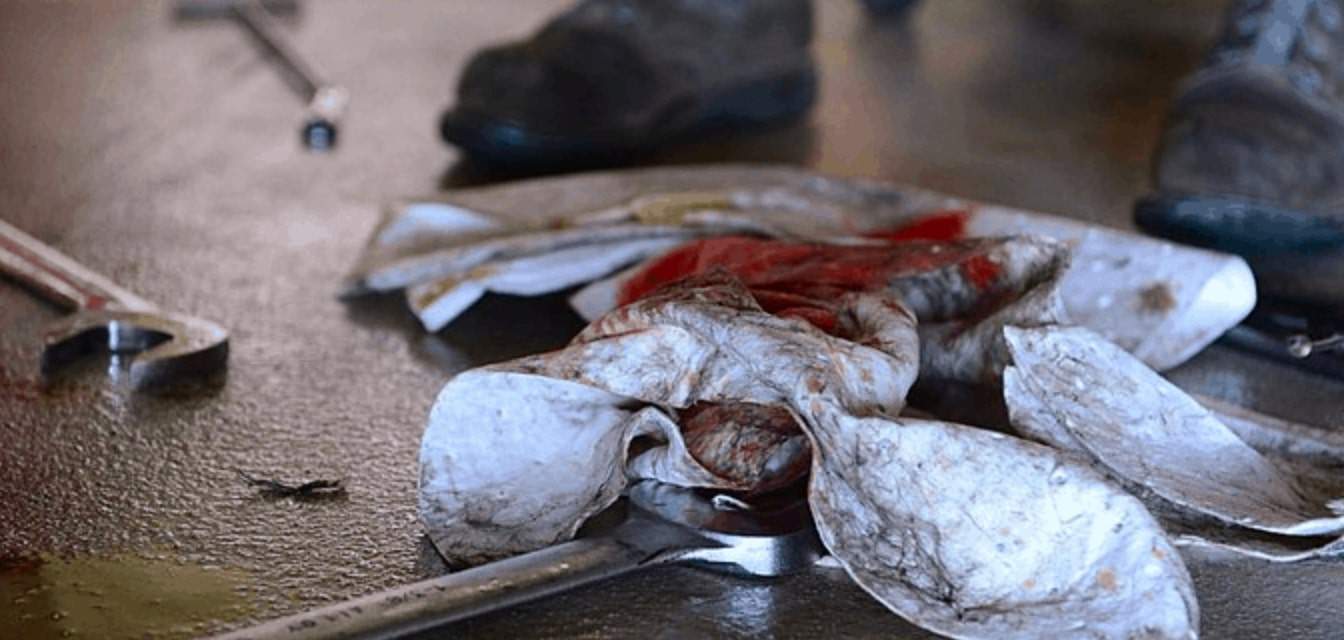If you’ve found red fluid under your Mazda BT-50, you probably have a transmission leak. A transmission leak is a big deal. If you let too much transmission fluid leak, the transmission will begin to slip, which can quickly cause long term damage.
Unlike oil, transmission fluid is flammable, and will flash if it hits the exhaust manifold. If it is leaking there (usually out the dipstick) it should be dealt with immediately. Thankfully, this scenario usually happens only while towing or if the transmission has been overfilled. Here’s a great resource on ATF flammability.
If your BT-50 is slowly leaking transmission fluid from the pan directly onto the ground, the transmission leak is as serious as when it leaks onto the exhaust. You should still deal with it right away.
Leaking Transmission Causes: Mazda BT-50
Here are some of the most common places that your Mazda BT-50 may leak transmission fluid from.
1. Transmission Pan/Gasket
The transmission pan takes a lot of abuse over the years. It is always low and close to the road. Eventually a rock or other type of road hazard can damage it to the point that is no longer sealed.
The transmission gasket is another point where the transmission can leak a lot of fluid in a short amount of time. The gasket can get brittle with enough time and heat applied to it. Or, it could have been damaged if you’ve recently had your transmission fluid changed.
Another thing to look for, particularly if you’ve recently had your transmission fluid changed, is the bolts that connect the pan to your BT-50’s transmission. If they weren’t properly torqued, then tightening them would definitely fix the leak.
Also, look at the drain plug bolt (if applicable). Is it loose or stripped?
2. Leaking Torque Converter
As the torque converter spins, it pumps transmission fluid into the main part of the Mazda BT-50’s transmission. If the torque converter has developed a crack or has internal damage, transmission fluid will leak from it.
3. Line Issue
There are lines that connect your transmission to the radiator. They allow the transmission fluid to be cooled off. If these lines get damaged in anyway, your BT-50 is going to leak transmission fluid. Finding the leak in the line can be tricky. Look at the lowest point, the ATF will pool and drip from there.
4. Bad Seals
There are many seals inside the transmission that keep the transmission fluid pressurized within it. When these seals go bad, the transmission can’t hold pressure as well and the transmission fluid will leak.
This is last on the list, since you should check all of the external places that a transmission can leak first. When it comes to looking for a bad seal, it’s something that should be left to a professional.
Driving Your BT-50 With a Leaking Transmission
If your BT-50’s transmission is leaking a quart of ATF or so every thousand miles, that’s going to be manageable. But, if you’re losing a quart every time you take a drive, that’s going to be a real problem, especially if you let the fluid level get too low.
When the transmission fluid level gets too low the transmission will begin to slip. This means that there is no longer enough fluid in the transmission for it to do its job as a hydraulic fluid that conducts energy from the crank through to the axles/driveshaft. Here’s more on transmission slipping diagnosis.
Once it begins to slip, your BT-50’s transmission will begin to wear at an unusually high rate. This is due to the transmission fluid also being a lubricant and acting as a coolant as well. Once you take away the lubricant and you let the transmission overheat, it begins to wear at an incredibly fast rate, and will soon not work at all.
Conclusion: BT-50 Transmission Leak Diagnosis
If your Mazda BT-50’s transmission is leaking directly from the transmission pan (far and away the most common area), than it is safe to drive. it should still be fixed right away.
Enough transmission fluid leaking anywhere can be dangerous. But, if you have a few drops showing up on the garage floor, and it only needs topped off now and then, it’s going to be safe. When in doubt, don’t drive a vehicle that you don’t feel comfortable driving, especially if you are smelling a burning smell.
A little leak now will often become a big problem later. Do yourself a favor and have it fixed. If there is anything you would like to add, please leave a comment below. Good luck!


